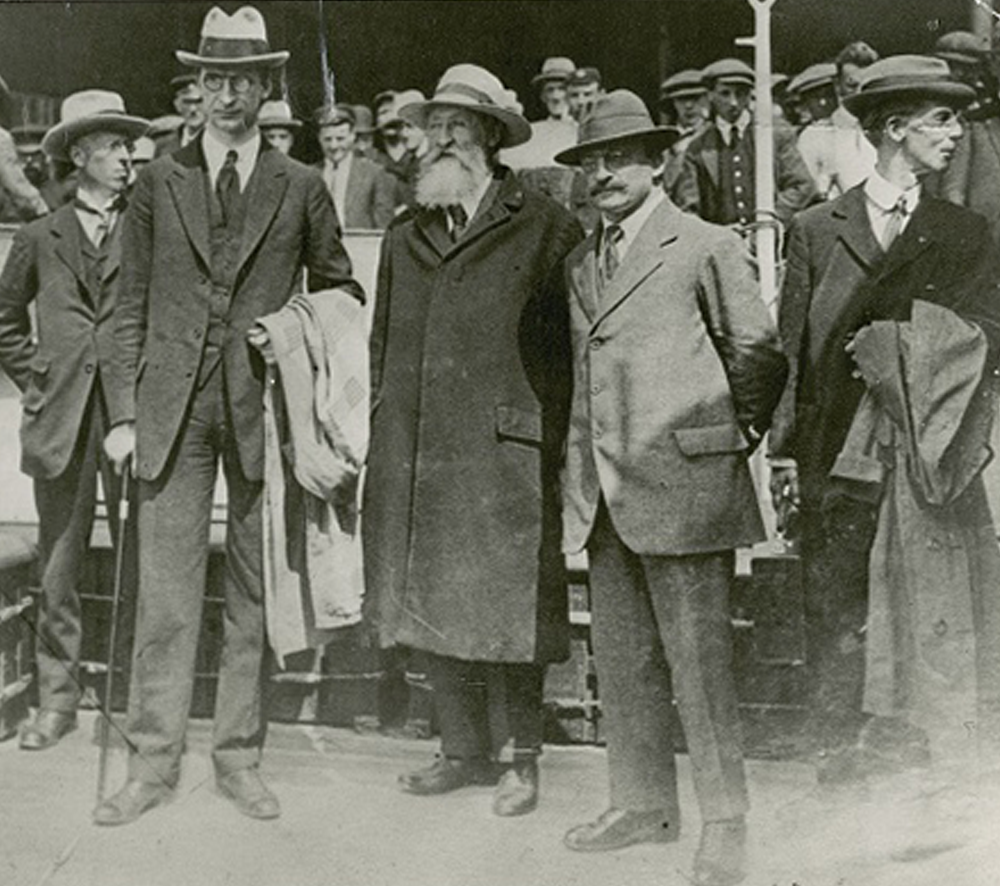1921
London October-December 1921
It was our first diplomatic negotiation and surely the most important one for it culminated in the Anglo-Irish Treaty which paved the way for Irish independence.
The Treaty negotiations came after more than two years of bitter conflict, which ended with a truce being declared on the 11th of July 1921. A few days later, Sinn Féin leader, Eamon de Valera, travelled to London to meet Prime Minister, Lloyd George, at Downing Street, where an enthusiastic crowd had gathered to support the Irish leader with songs and prayers.
Those talks lasted a week but failed to produce a meeting of minds. Then in September 1921, the British Government made an offer of negotiations 'to ascertain how an association of Ireland with the community of nations known as the British Empire can best be reconciled with Irish national aspirations' which was accepted.

In what was probably the most controversial decision in modern Irish history, de Valera decided not to participate in the London negotiations. Instead, the Irish delegation was composed of Michael Collins, Arthur Griffith, Robert Barton, Eamon Duggan, George Gavan Duffy, Erskine Childers and John Chartres.
The Irish negotiators were up against it in London. Facing them across the negotiating table were two of the most able British politicians of the 20th century, David Lloyd George and Winston Churchill. The British team, which also included Lord Birkenhead who had prosecuted Roger Casement in the summer of 1916, possessed a vast store of government experience.
The negotiations began on the 11th of October and continued for eight weeks. The key issues needing to be resolved concerned Ireland's future relationship with the Crown and the future status of the six counties of Northern Ireland.
The talks came to an end in the early hours of the 6th of December when both delegations signed a document which began: 'Ireland shall have the same constitutional status in the Community of Nations known as the British Empire' as the dominions of Canada, Australia, New Zealand and South Africa.
On the Ulster question, the Irish delegation perhaps placed undue faith in a Boundary Commission established by the Treaty which it was hoped would result in the counties of Tyrone and Fermanagh being transferred to the new Irish Free State.
The outcome of the London negotiations thus went well beyond the Home Rule settlement of 1914. But Ireland had changed dramatically in the intervening years and the Treaty, and especially the inclusion of an oath of allegiance to the British Crown, proved deeply divisive. This gave rise to a catastrophic civil war and generated political animosities that lasted generations. But the Treaty did allow Ireland to develop its international profile and therefore all the achievements of Irish foreign policy this past century stem from that fateful set of negotiations in London during the closing weeks of 1921.
None of those who took part in the Irish delegation went on to have a long innings in Irish politics or diplomacy. Collins and Griffith were both dead within a year. Erskine Childers was executed in November 1922 during Ireland's Civil War. George Gavan Duffy served as Ireland's first Foreign Minister, but soon resumed his legal career. On the British side, Lloyd George was ousted as Prime Minister within a year while Churchill was to have a chequered career until the crisis of 1940 gave him an opportunity to shine as a wartime leader. By that time, de Valera, absent from the Treaty negotiations, was at the helm in Dublin, maintaining Irish neutrality through the crisis of World War 2.
Daniel Mulhall
About the Author
Daniel Mulhall has been Ireland’s Ambassador in London since September 2013. After studying history at University College Cork, he has maintained a lifelong interest in Irish history and literature. His most recent publication is The Shaping of Modern Ireland: a centenary assessment (2016) which he co-edited with Eugenio Biagini. He posts regular blogs on his work as Ambassador, and on literary/historical topics, on the Embassy’s website.


